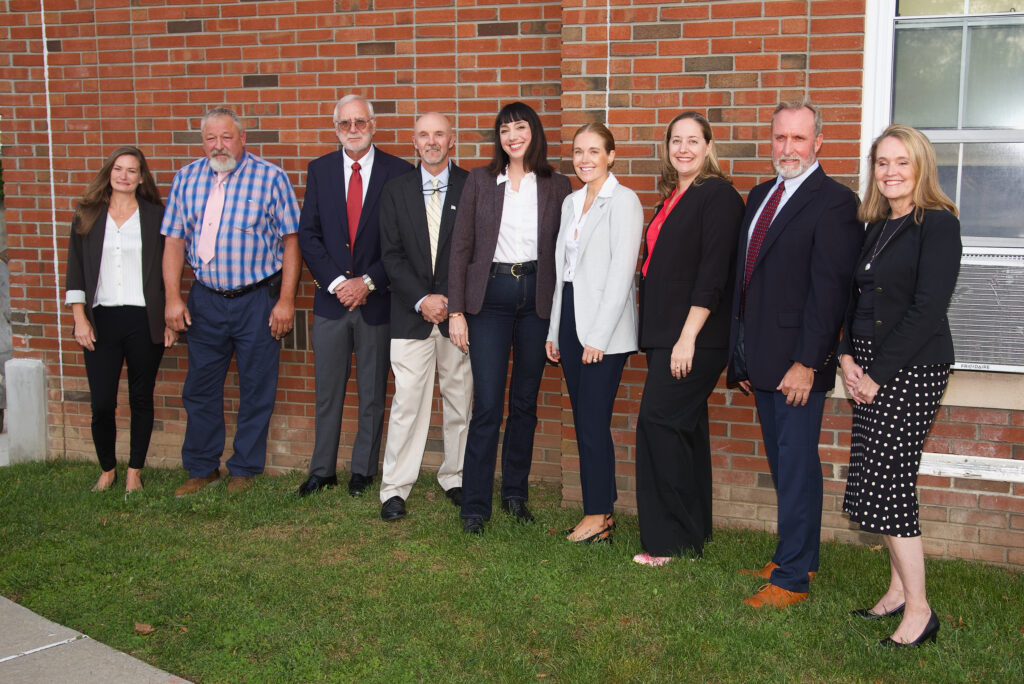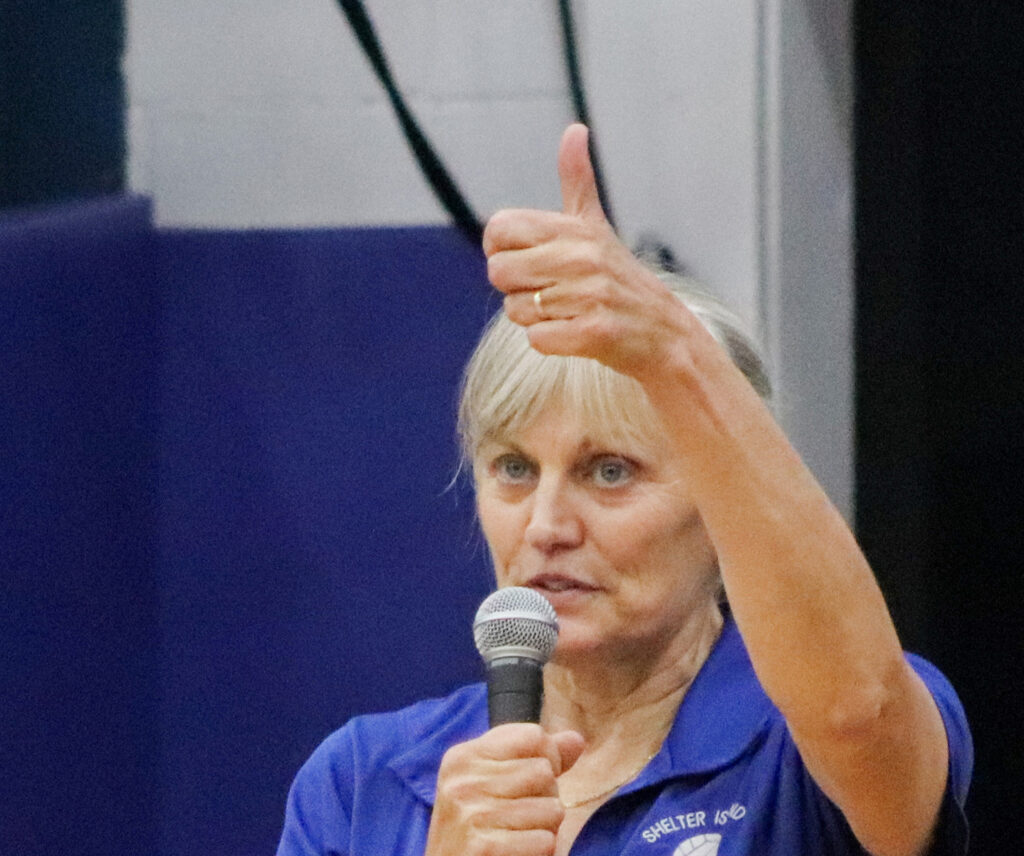Shelter Island candidates take stage for votes

For the first time, an Oct. 19 forum at the Shelter Island School auditorium included all nine candidates for four offices — supervisor, Town Board members, Town Clerk and Highway Superintendent.
Most candidates focused on their own qualifications more than arguing why their opponents shouldn’t get votes.
League of Women Voters of the Hamptons, Shelter Island and the North Fork moderator Jo-Ann Robotti posed the questions, and most candidates responded without making attacks against opponents.
Supervisor: Amber Brach-Williams vs. Gordon Gooding
Because local elections will be timed to coincide with state elections, the winner of this race will be elected for one year, not two.
Incumbent Supervisor Amber Brach-Williams asked voters if they want a seasoned and experienced person at the helm or a candidate who has only been a councilman since January. Gordon Gooding has a stiff learning curve, she maintained.
Mr. Gooding countered, maintaining the status quo means unchecked spending that needs to be brought under control, not just at budget time, but every day. “We’ve been talking fund balance for a number of years and have to stop some of the spending,” Mr. Gooding said.
“We are not in any crisis” financially, Ms. Brach-Williams said. Her opponent doesn’t understand the difference between assessments and tax rates, she added.
For about three years, insufficient staffing in the assessors office meant a lack of annual property assessments. There was a hiring of an assessor who did not work out and had to be bought out of his contract, Ms. Brach-Williams said, breaking that news for the first time.
William McCoy, the professional assessor who had been hired in October 2022, was gone by February 2023. No announcement of his departure was made known by then supervisor Gerry Siller who, when questioned, said all the Town was able to report was the dates of his employment and not details of why he was no longer in office. Mr. McCoy didn’t return calls for comment about his leaving the post.
Ms. Brach-Williams said elected assessors Judith Lechmanski and Patricia Castoldi were understaffed to continue annual assessments. She also said the COVID pandemic in 2020 had stalled the effort. When full assessment, considered the gold standard, was resumed in 2024, it had underestimated the rates others were paying and fairness was restored under full assessment.
The supervisor pointed to her budget draft for 2026 that recommends a 2.2% hike in spending. As for the use of money in the fund balance, she said the fund gets replenished mostly because revenues have always been stated conservatively and it’s typical that most years, those revenues from the previous year produced more money than had been expected. That has been true except in 2020, the first year of the pandemic.
Mr. Gooding said budgeting should begin in August, not September with much of the work being done in October. Ms. Brach-Williams said she starts speaking to department heads and committee chairs for their anticipated spending earlier, but still needs audited financials to ensure what has been spent, or encumbered to be spent in the current year, as a check on actual needs.
Mr. Gooding said transparency is lacking. When he’s expected to sign off on spending, the Town Board members don’t have background information to judge expenditures. Ms. Brach-Williams said monthly reports are transparent, a practice Mr. Gooding says he initiated, while she maintains they were in existence before Mr. Gooding was on the Town Board.
Mr. Gooding said it’s taking too long to get a new Comprehensive Plan adopted and he would not make major code changes until the Plan is adopted. He also said there is too much dependence on subcommittees.
Ms. Brach-Williams said her priorities include dealing with wastewater remediation and the need for more affordable housing.
Wastewater is also a priority for Mr. Gooding along with controlling spending and developing affordable housing.
Town Board: Three candidates seek seats: Margaret Larsen, Thomas Cronin, Elizabeth Hanley
Greg Toner was a candidate who dropped out of the race because of health issues, but it was too late to get his name off the ballot. He has asked voters not to choose him since he would not be able to serve. Votes cast for him could affect one or more of the three candidates seeking the seats.
Councilwoman Larsen has functioned as deputy supervisor since being elected to the Town Board.
The initial question Ms. Robotti posed to the three was how to mesh concerns about water and septics with Accessory Dwelling Units. Mr. Cronin said he favors building ADUs but not in areas where they can impact the waterfront or in areas where the aquifer would be impacted.
Ms. Hanley had an advantage with the question as chairwoman of the Community Housing Board that has secured $3.5 million for ADUs and she knows the rules. No ADUs can be constructed in sensitive areas and all such construction is subject to existing codes.
Should the Town wait to develop a master plan for the buildings it owns that ensures upgrades to septic and water systems will meet with current and future uses of those buildings?
Wait for the master plan, Mr. Cronin said. It doesn’t make sense not to wait, because there are too many unknowns, he said.
Ms. Hanley noted that Shelter Island is under a mandate that public buildings have potable water; the Town must address water quality in Center buildings and ensure money it has is spent wisely and not used in a knee-jerk fashion but with a well developed plan.
Ms. Larsen said evaluating a public building use is important. Given the relative little use septic systems at Police Headquarters and Justice Court get, other public buildings must come first in reordering their heavier use. A plan must be developed to evaluate usage in the Center that best meets everybody’s needs, she added.
What changes should be made in the wetlands code? Ms. Larsen said one of her assignments is working with a subcommittee examining the code to recommend changes to the full Town Board.. The Causeway section, she said, is being eliminated because there is no buildable land there that would be affected.
Mr. Cronin said he isn’t familiar enough with the code and Ms. Hanley said code changes seem to be “little bandaids” instead of a more thorough approach that should stem from a Comprehensive Plan.
Ms. Larsen said she and Ms. Brach-Williams are pulling together the last chapter of the Comp Plan draft and predicted it could soon be ready for public workshops prior to being finalized and completed by the end of the year.
Town Clerk: Incumbent Amber Wilson is being challenged by account clerk Shelby Mundy
Both candidates have rendered major service to the Brach-Williams administration — Ms. Wilson assuming the Town Clerk’s job in the wake of Dorothy Ogar’s decades in that role, and Ms. Mundy becoming a trusted aide to the supervisor with finances. They both stressed the importance of stepped-up technology to making the Town Clerk’s office more efficient and more responsive to residents.
Ms. Mundy said increased use of technology will replace confusion and make the work of the Town Clerk more efficient. Ms. Wilson said she is already digitizing records and her request for a larger scanner will enable large records to be entered into the system. With that, there will be less need for staff to spend hours searching for information requested by the public because people will be able to access information on their own. She said Ms. Ogar trained her to see the office as nonpartisan and respond quickly to requests for information.
Ms. Mundy said current operating hours need to be changed so staff can be available beyond 9 to 4 weekdays. She will provide staggered hours for the staff so overtime costs won’t be needed.
Ms. Wilson ended Saturday hours, she said, to save money because it was largely open to serve requests for parking permits, something that can be achieved online, adding that new technology is indexing information to make it quickly accessible. Her hopes for more money for technology are being realized. She is set to meet with the Town’s grants consultant Jennifer Mesiano Higham with the possibility some grant money could help purchase other technology.
Ms. Mundy wants to improve communications with the public and suggested social media might be useful to better inform residents and visitors. She also said she wants to reach out to various groups, including seniors; she would go to the Senior Center and luncheons at the Presbyterian Church to learn how she could assist them.
Highway Superintendent: Ken Lewis Jr. vs. Michael Reiter
“I love the job,” Mr. Lewis said, adding he was mentored by former highway superintendents Jay Card Jr. and Brian Sherman.
Mr. Reiter, who has worked with the department for 20 years, described himself as a team player and problem solver. “I think I could do a great job” as highway superintendent,” Mr. Reiter said.
Both spoke about their experience in clearing roadsides, upgrading town landings, paving roadways and dealing with construction projects in the town that needed attention.
Mr. Lewis said he has greatly improved the Goody Pile, making some metals and construction items available in a safe way. Safety, he said, is his main concern.
Mr. Reiter would again reopen the area to “pickers” who could enter to choose what materials suit their needs in a safe way.
This was a bone of contention in the early part of Mr. Lewis’ term and some still feel differently about the end of their ability to access the area. But Mr. Lewis is firm about closing the area to pickers because he saw it as a danger to them and to Highway Department employees.
Since the area the pickers used to retrieve metal and construction debris has been closed to the public, the Town has raised its income from these materials taken off Island for disposal by 20%, Mr. Lewis said.
Mr. Reiter said he wold be looking for other places to sell materials, expressing confidence in being able to increase revenues for materials.









